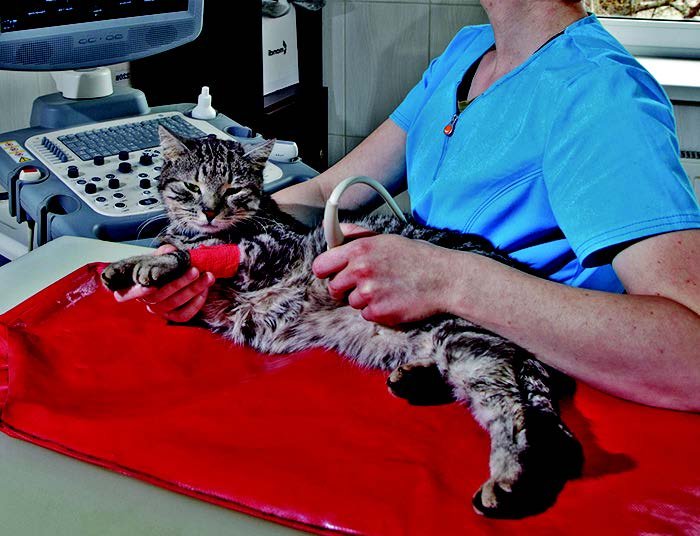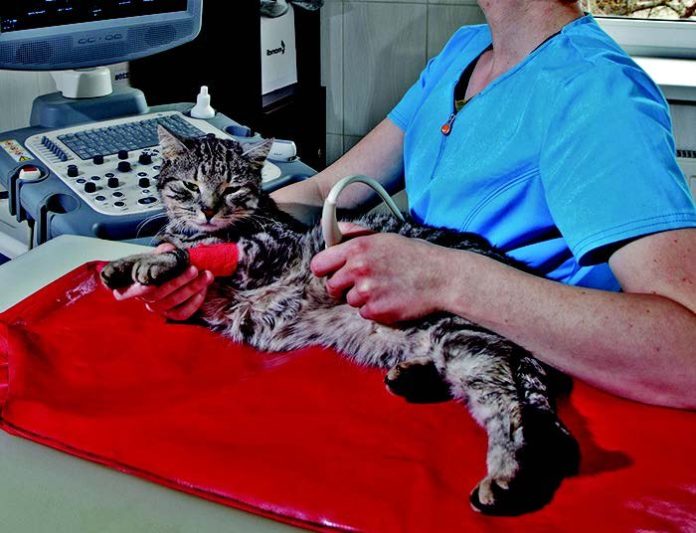burdun | Deposit Photos

Diarrhea is no fun for anyone, especially if the cat doesn’t make it to the litterbox or gets some of it on her fur. The good news is that occasional diarrhea is rarely an emergency and often resolves on its own.
When to Worry
“Many cases of diarrhea in dogs and cats are mild and self-limiting,” says Meredith Miller, DVM, DACVIM, Section Co-chief of Small Animal Medicine at the New York State College of Veterinary Medicine at Cornell. “If a pet stops eating, is lethargic, the diarrhea is black or tarry in quality, there is associated vomiting, or the diarrhea doesn’t resolve in 48 to 72 hours, then veterinary care should be sought.”
Prolonged diarrhea causes dehydration because the stool passes through the gastrointestinal (GI) tract so quickly that water is not absorbed from it normally. If a cat is also vomiting, the level of dehydration will worsen. Dehydration leads to electrolyte imbalances in the body and decreases the ability of the kidneys to filter waste products from the blood. Over time, dehydration can contribute to organ failure and even death.
Black stool (or “melena”) is caused by partially digested blood and may indicate bleeding in the upper part of the GI tract. Causes include inflammation, ulcers, infections, tumors, trauma, a foreign body, and bleeding in the mouth or respiratory tract. However, if the melena accompanies diarrhea, the root of the issue is more likely to be in the GI tract.
Bland Diet
If your cat just started having diarrhea and is otherwise behaving normally, you can help resolve the issue by giving her GI tract a break.
“Mild cases of diarrheain both cats and dogs can be treated at home by feeding a bland diet such as boiled chicken or low-fat hamburger and white rice,” says Dr. Miller. “Owners should avoid excessive treats or rich food until the diarrhea resolves.”
While boiled chicken and hamburger with rice are easily digestible and less likely to irritate your cat’s stomach and intestines, they are not appropriate for long-term feeding because they lack necessary nutrients.
Diarrhea that starts while switching to a new food may indicate you made the switch too fast for your cat. Go back to feeding more of the original diet, and once her stool has firmed up, resume the transition more gradually.
While most cats can switch to a new food over the course of four to five days (feeding 75 percent old food with 25 percent new food, then 50/50, then 25 percent and 75 percent), sensitive cats may need to span the transition over a week or two to allow their GI tract to adjust. If limiting your cat to a diet that she normally tolerates well and it doesn’t work in a day or two, seek help.
Causes
Finding the cause of the diarrhea can be challenging, depending on the duration and severity of the diarrhea and any concurrent symptoms. A stool sample will be helpful so your veterinarian can check for parasites.
Transient causes of diarrhea include:
-Dietary indiscretion
-Switching to a new food too quickly
-A stressful event such as seeing the vet
-Internal parasites
More serious causes of diarrhea include:
-Infection in the GI tract
-Inflammation in the GI tract
-Cancer
-Toxicity
-Kidney disease
-Liver disease
-Hyperthyroidism
-Immune disorders
-Viruses, including feline distemper
-Treatment
Treatment will vary, depending on the suspected or known cause. A cat that has only had diarrhea for a couple days and otherwise appears healthy may just be sent home with medications to normalize the GI tract. For cats that show other signs of illness or who have been having chronic diarrhea, the veterinarian will probably do bloodwork, plus or minus x-rays and/or an abdominal ultrasound to check for blockages.
Metronidazole (or Flagyl) is the closest thing there is to a miracle drug for diarrhea. It is antimicrobial, antiprotozoal, and anti-inflammatory. Cats usually tolerate it well, but it does have the ability to cross the blood-brain barrier, which can lead to a potential for the development of neurologic signs (thankfully this side effect is usually limited to high doses and is reversible once you stop giving the medication).
Probiotics also can help to normalize your cat’s GI tract and firm up her stools. Many veterinarians will prescribe metronidazole and a probiotic together for pets with diarrhea.
The most important thing to remember is that diarrhea can progress to a much bigger problem if you just let it go. Loose stools that last more than a couple of days require treatment.




